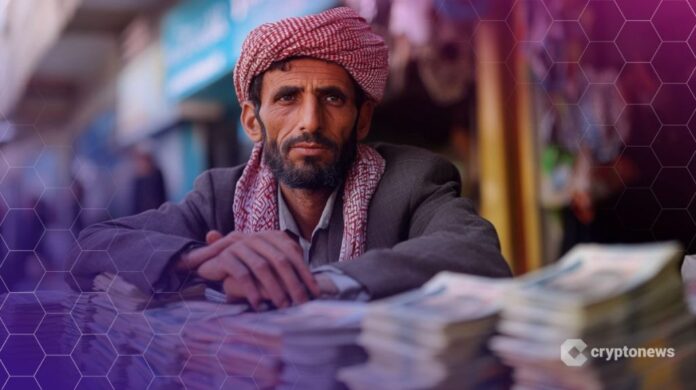US sanctions against the Houthi group push transformation to the use of digital assets.
With continuous conflicts and financial sanctions by destabilizing the Yemeni economy, the orientation of ordinary citizens with decentralized financing systems (DEFI) increases as an alternative to traditional banking systems, according to a new report published by TRM Labs on April 17. Cratpo sector.
The conflict pushes the Yemenis to decentralized financing systems in the midst of a banking collapse
With the limited adoption of digital assets in Yemen due to the low local Internet infrastructure and the lack of sufficient financial knowledge, the current conflict has made a lot of way exploring new ways of benefiting from the various financing systems; As the TRM Labs report explained: “There are indications of growing interest in these systems and to use them as a result of urgent necessity in the first place, not for speculation.” Digital assets have become citizens of the lifestyle of financial services due to the disruption of many banks in Yemen or it was not possible to reach the civil war which has continued since 2014, which broke out after the internationally recognized government and the Houthis.
American sanctions – in particular those which targeted the International Bank of Yemen on April 17 – led to the increase in suffering of many in access to banking services, and TRM data show that the DEFI platforms dominate the activities of Yemeni Circassian companies and represent more than 63% of their activities on the Internet; While their activities related to the world’s central sidewalk platforms represent only 18%, with a good counterpart rate to the counterpart (P2P), in particular with regard to international payments and transfers.
The report indicated that “these activities may not represent large sizes, but they focus on providing aspects of decentralized profit systems for people who are facing restrictions that deprive them of taking advantage of banking services”. Its attractiveness lies in its transactions which are not a mediator, which is necessary due to the disruption of local banks or their services.
The absence of a regulatory framework for CRIPTO in Yemen can accelerate the pace of adoption, in the midst of growing sanctions
Yemen currently lacks official regulatory laws for digital assets, but the report estimates that the increase in sanctions can stimulate the adoption of large -scale digital assets in the country.
In the wake of the US government recovery from Houthis as a group designed to practice terrorist activities worldwide in January 2024, a Yemenite commercial platform – which TRM laboratories included in its report – experienced an increase in its 270%negotiation volumes. Despite its stability at the time, it increased by 223% additional after Donald Trump was elected president and the group was ranked again as a foreign terrorist organization.
The TRM report concluded by saying: “When the restriction of access to traditional financial services increases, decentralized chipto systems provide a less likely alternative to regulatory laws and monitoring transactions.” The report suggests that geopolitical tensions continue to cause the use of chipto and the development of its technologies in Yemen.
This week, the secret services have seized areas linked to the Russian crypto Exchang Garantine, freezing $ 26 million in criminal funds, bring a serious financial blow to cybercriminals worldwide.
Read more: https://t.co/9gcbi0on0p#Secretviceinvestigate #Cybercrime pic.twitter.com/2qa0qvosee
– Us Secret Services (@secretservice) March 7, 2025
This month, the US Treasury has imposed new sanctions aimed at dismantling financial networks supporting the Yemenite Houthi group, and was concentrated in particular on Kippo services, while the OFAC control office (OFAC) was included in a movement coordinated eight seats of the group of the cryptocurrency to practice the world of terrorist activities.
Follow us via Google News
The post is a report indicating that the Yemenis has transformed into decentralized financing systems (DEFI) after blocked traditional banking services of them following sanctions that first on Arab cryptonews.


